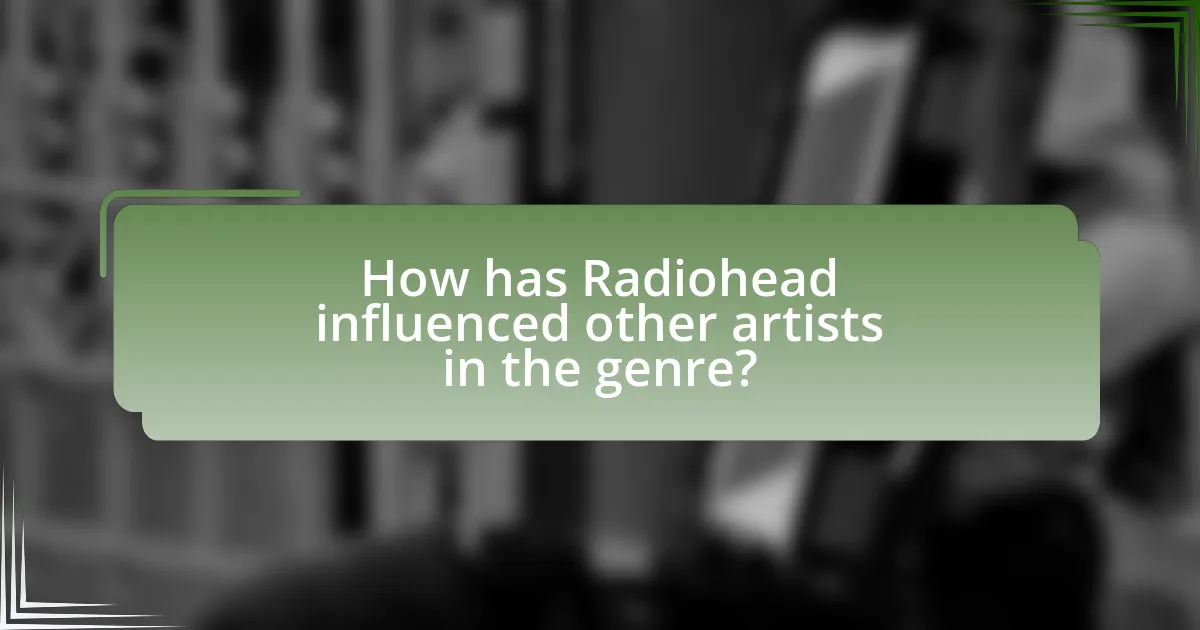Radiohead is a pivotal entity in experimental rock music, recognized for their innovative sound, complex structures, and introspective lyrics. The article examines the band’s evolution from alternative rock to a more experimental style, highlighting key albums such as “OK Computer” and “Kid A,” which introduced electronic elements and abstract themes. It also explores the influence of their experimentation with technology on their music, the societal issues reflected in their lyrics, and their lasting impact on contemporary artists and the genre as a whole. Additionally, the article discusses critical receptions of their work and the lessons emerging artists can learn from Radiohead’s career.

What is the significance of Radiohead in experimental rock music?
Radiohead is significant in experimental rock music for their innovative approach to sound, structure, and lyrical content, which has influenced countless artists and genres. Their albums, particularly “OK Computer” and “Kid A,” showcase a blend of electronic elements, unconventional song structures, and introspective themes, pushing the boundaries of rock music. The band’s willingness to experiment with technology and genre, such as incorporating ambient music and jazz influences, has redefined what rock can encompass. Their impact is evidenced by numerous accolades, including Grammy Awards and critical acclaim, solidifying their status as pioneers in the genre.
How did Radiohead’s sound evolve over the years?
Radiohead’s sound evolved significantly from their debut album “Pablo Honey” in 1993 to their later works, showcasing a transition from alternative rock to a more experimental and electronic style. Initially, their music featured conventional rock structures and guitar-driven melodies, exemplified by the hit “Creep.” However, with the release of “OK Computer” in 1997, Radiohead began incorporating complex arrangements, abstract lyrics, and a blend of electronic elements, marking a shift towards a more atmospheric and introspective sound. This evolution continued with “Kid A” in 2000, where the band embraced avant-garde influences, utilizing synthesizers, unconventional song structures, and a departure from traditional rock instrumentation. Subsequent albums like “Amnesiac” and “Hail to the Thief” further explored these experimental tendencies, solidifying Radiohead’s status as pioneers in the genre of experimental rock music. Their willingness to innovate and challenge musical norms has had a lasting impact on the genre, influencing countless artists and reshaping the landscape of modern rock.
What key albums marked significant changes in their musical style?
“OK Computer” marked a significant change in Radiohead’s musical style, transitioning from alternative rock to a more experimental sound characterized by electronic elements and complex arrangements. This 1997 album introduced themes of alienation and technology, influencing the direction of rock music. Following this, “Kid A,” released in 2000, further shifted their style towards abstract soundscapes and minimalism, incorporating influences from electronic music and jazz, which solidified their status as pioneers in experimental rock. Both albums are critical in understanding Radiohead’s evolution and their impact on the genre.
How did their experimentation with technology influence their music?
Radiohead’s experimentation with technology significantly influenced their music by integrating electronic elements and unconventional production techniques. This approach is evident in albums like “Kid A” and “Amnesiac,” where they utilized software like Pro Tools and various synthesizers to create a sound that diverged from traditional rock. Their use of sampling, looping, and digital manipulation allowed for a more abstract and atmospheric sound, which redefined the boundaries of rock music. The incorporation of these technologies not only expanded their sonic palette but also inspired a generation of artists to explore similar experimental avenues, solidifying Radiohead’s role as pioneers in the genre.
What themes and concepts are prevalent in Radiohead’s lyrics?
Radiohead’s lyrics frequently explore themes of alienation, technology, and existential angst. The band’s work often reflects a deep sense of disconnection from society and the self, as seen in songs like “Creep,” which articulates feelings of inadequacy and isolation. Additionally, their lyrics critique modern technology’s impact on human relationships and identity, evident in tracks such as “Fitter Happier,” which presents a sterile, consumer-driven existence. The concept of existential dread permeates their music, with references to the fragility of life and the search for meaning, particularly in songs like “How to Disappear Completely.” These themes are reinforced by the band’s innovative soundscapes, which complement the lyrical content, creating a cohesive exploration of contemporary human experience.
How do these themes reflect societal issues?
The themes in Radiohead’s music reflect societal issues by addressing topics such as alienation, consumerism, and political disillusionment. For instance, the song “Paranoid Android” critiques the dehumanizing effects of modern technology and capitalism, illustrating how individuals feel disconnected in a fast-paced, consumer-driven society. Additionally, “Idioteque” tackles climate change and societal anxiety, highlighting the urgency of environmental issues and the fear of societal collapse. These themes resonate with listeners, as they mirror real-world concerns about identity, environmental degradation, and the impact of technology on human relationships.
What literary influences can be identified in their songwriting?
Radiohead’s songwriting is influenced by various literary sources, notably the works of Franz Kafka and T.S. Eliot. Kafka’s themes of alienation and existential dread resonate in songs like “Paranoid Android,” where the lyrics reflect a sense of disconnection from society. T.S. Eliot’s fragmented narrative style and exploration of modernity can be seen in tracks such as “The Bends,” which incorporates a stream-of-consciousness approach. These literary influences contribute to the band’s complex lyrical themes and enhance their experimental rock sound, demonstrating a deep engagement with literary traditions.

How has Radiohead influenced other artists in the genre?
Radiohead has significantly influenced other artists in the experimental rock genre by pioneering innovative soundscapes and unconventional song structures. Their use of electronic elements, as seen in albums like “Kid A,” has inspired bands such as Alt-J and The National to incorporate similar techniques into their music. Additionally, Radiohead’s emphasis on lyrical depth and emotional complexity has encouraged artists like Bon Iver and Fleet Foxes to explore more introspective themes in their songwriting. The band’s willingness to challenge traditional rock norms has led to a broader acceptance of genre-blending, impacting the creative directions of numerous contemporary musicians.
Which contemporary bands cite Radiohead as an influence?
Contemporary bands that cite Radiohead as an influence include Coldplay, Muse, and The 1975. Coldplay’s frontman Chris Martin has acknowledged Radiohead’s impact on their sound, particularly in their use of atmospheric elements. Muse has often drawn inspiration from Radiohead’s experimental approach, especially in their album “Origin of Symmetry.” The 1975’s frontman Matty Healy has also mentioned Radiohead as a significant influence, particularly in their blending of genres and innovative soundscapes. These bands reflect Radiohead’s lasting impact on the landscape of experimental rock music.
What specific elements of Radiohead’s music have been adopted by these bands?
Radiohead’s music has influenced various bands through specific elements such as atmospheric soundscapes, unconventional song structures, and the use of electronic instrumentation. Bands like Coldplay and Muse have adopted Radiohead’s atmospheric soundscapes, characterized by layered guitar effects and ambient synths, which create a sense of depth and emotion in their music. Additionally, the unconventional song structures seen in Radiohead’s tracks, often eschewing traditional verse-chorus formats, have been mirrored by bands like Alt-J, who incorporate complex arrangements and varied time signatures. Furthermore, the integration of electronic elements, such as sampling and digital manipulation, has been embraced by bands like The 1975, reflecting Radiohead’s pioneering use of technology in music production.
How has Radiohead’s approach to live performances impacted other artists?
Radiohead’s approach to live performances has significantly influenced other artists by prioritizing immersive experiences and innovative technology. Their use of elaborate visual effects, complex setlists, and a focus on creating a unique atmosphere has encouraged many musicians to adopt similar strategies. For instance, artists like Björk and Arcade Fire have incorporated multimedia elements and dynamic stage designs in their performances, reflecting Radiohead’s emphasis on artistic expression over traditional concert formats. Additionally, Radiohead’s willingness to experiment with sound and structure during live shows has inspired a generation of musicians to explore non-linear song arrangements and improvisation, further pushing the boundaries of live music.
What role has Radiohead played in the evolution of experimental rock music?
Radiohead has significantly influenced the evolution of experimental rock music by integrating diverse musical styles and innovative production techniques into their work. Their albums, particularly “OK Computer” and “Kid A,” introduced unconventional song structures, electronic elements, and abstract lyrics, which challenged traditional rock norms. The band’s willingness to experiment with sound and form has inspired countless artists and reshaped the landscape of modern rock, as evidenced by their critical acclaim and the adoption of similar experimental approaches by subsequent musicians.
How did their innovations challenge traditional rock music norms?
Radiohead’s innovations challenged traditional rock music norms by incorporating electronic elements, unconventional song structures, and abstract lyrical themes. Their album “OK Computer” (1997) exemplified this shift, blending rock with electronic music and addressing themes of alienation and technology, which diverged from the typical rock focus on personal relationships and rebellion. Additionally, their use of non-standard time signatures and experimental instrumentation, as seen in tracks like “Pyramid Song,” further pushed the boundaries of rock music, encouraging other artists to explore new sonic landscapes. This approach not only redefined the genre but also influenced a generation of musicians to embrace experimentation over conventionality.
What impact did their genre-blending have on the music industry?
Radiohead’s genre-blending significantly transformed the music industry by pushing the boundaries of rock and integrating elements from electronic, jazz, and classical music. This innovative approach not only expanded the sonic possibilities within rock music but also influenced a generation of artists to experiment with diverse styles, leading to the emergence of subgenres like art rock and post-rock. The band’s album “OK Computer,” released in 1997, is often cited as a pivotal moment that showcased this blending, earning critical acclaim and commercial success, which encouraged record labels to invest in more experimental acts. As a result, Radiohead’s influence can be seen in the works of numerous contemporary artists who adopt similar genre-defying techniques, thereby reshaping the landscape of modern music.
What are the critical receptions of Radiohead’s work?
Radiohead’s work has received widespread critical acclaim, often being hailed as innovative and influential within the experimental rock genre. Their albums, particularly “OK Computer” and “Kid A,” have been lauded for their complex soundscapes and exploration of themes such as alienation and technology. “OK Computer” was named the best album of the 1990s by multiple publications, including Rolling Stone, which praised its ambitious production and lyrical depth. Similarly, “Kid A” received a perfect score from Pitchfork and was recognized for its departure from traditional rock structures, incorporating electronic elements and abstract lyrics. Critics frequently cite Radiohead’s ability to evolve their sound while maintaining emotional resonance as a key factor in their enduring impact on music.
How have music critics responded to Radiohead’s albums over time?
Music critics have generally responded positively to Radiohead’s albums over time, often praising their innovation and artistic evolution. For instance, their 1997 album “OK Computer” received widespread acclaim, with critics highlighting its complex themes and soundscapes, leading to its designation as one of the greatest albums of all time by publications like Rolling Stone and NME. Subsequent albums, such as “Kid A” in 2000, were noted for their departure from traditional rock elements, earning accolades for their experimental approach and influence on the genre. Critics from sources like Pitchfork and The Guardian have consistently recognized Radiohead’s ability to push boundaries, with their later works, including “A Moon Shaped Pool” in 2016, continuing to receive high praise for their depth and innovation. Overall, Radiohead’s discography has been marked by critical recognition, reflecting their significant impact on experimental rock music.
What are some notable reviews that highlight their experimental nature?
Notable reviews that highlight Radiohead’s experimental nature include those from Pitchfork and The Guardian. Pitchfork described the band’s album “Kid A” as a “radical departure” that redefined the boundaries of rock music, emphasizing its use of electronic elements and unconventional song structures. The Guardian praised “OK Computer” for its innovative soundscapes and lyrical depth, noting that it pushed the genre into new territories. These reviews underscore Radiohead’s influence in experimental rock, showcasing their willingness to challenge musical norms and explore new sonic landscapes.
How do fan perceptions compare to critical receptions?
Fan perceptions of Radiohead often emphasize emotional connection and personal resonance, while critical receptions tend to focus on technical innovation and artistic merit. Fans frequently celebrate the band’s ability to evoke feelings and create immersive experiences, as seen in their albums like “OK Computer,” which is praised for its exploration of alienation. Critics, on the other hand, highlight Radiohead’s experimentation with sound and structure, noting their influence on the genre of experimental rock, as evidenced by accolades such as the Grammy Award for Best Alternative Music Album for “Kid A.” This divergence illustrates that while fans may prioritize emotional engagement, critics assess the band’s contributions through a lens of artistic significance and innovation.
What are the lasting legacies of Radiohead in experimental rock music?
Radiohead’s lasting legacies in experimental rock music include their innovative use of technology, genre-blending soundscapes, and profound lyrical themes. The band pioneered the integration of electronic elements with traditional rock instrumentation, as evidenced in albums like “Kid A,” which incorporated ambient music and glitch aesthetics, influencing countless artists in the genre. Their willingness to challenge conventional song structures and embrace unconventional time signatures has set a precedent for experimentation in rock music. Additionally, Radiohead’s exploration of themes such as alienation and societal critique resonates deeply within the genre, inspiring a new wave of artists to address complex emotional and political issues in their work. This combination of technological innovation, genre fusion, and thematic depth solidifies Radiohead’s significant impact on the evolution of experimental rock music.
How has their music influenced the direction of future experimental rock artists?
Radiohead’s music has significantly influenced the direction of future experimental rock artists by pioneering innovative soundscapes and unconventional song structures. Their albums, particularly “OK Computer” and “Kid A,” introduced elements such as electronic manipulation, ambient textures, and complex time signatures, which have become hallmarks of the genre. This experimentation has inspired artists like Alt-J and Grizzly Bear, who incorporate similar techniques in their work. Additionally, Radiohead’s willingness to challenge traditional music industry norms, such as their pay-what-you-want model for “In Rainbows,” has encouraged emerging artists to explore alternative distribution methods and creative freedom.
What lessons can emerging artists learn from Radiohead’s career?
Emerging artists can learn the importance of artistic evolution and innovation from Radiohead’s career. Radiohead consistently pushed musical boundaries, transitioning from alternative rock to experimental sounds, as seen in albums like “OK Computer” and “Kid A,” which incorporated electronic elements and unconventional song structures. This willingness to experiment has allowed them to remain relevant and influential over decades, demonstrating that embracing change can lead to artistic longevity. Additionally, their approach to album releases, such as the pay-what-you-want model for “In Rainbows,” highlights the significance of challenging traditional industry norms and engaging directly with fans. This strategy not only increased their fanbase but also set a precedent for independent distribution, showing emerging artists the value of innovation in both music and business practices.
What practical insights can be drawn from Radiohead’s approach to music creation?
Radiohead’s approach to music creation emphasizes experimentation, collaboration, and the integration of technology, providing practical insights for artists. The band frequently explores unconventional song structures and sounds, as seen in albums like “Kid A,” which incorporates electronic elements and ambient influences, demonstrating the value of pushing creative boundaries. Additionally, Radiohead’s collaborative process, involving all members in songwriting and arrangement, highlights the importance of teamwork in fostering innovation. Their use of technology, such as digital distribution and interactive media, exemplifies how artists can adapt to changing industry landscapes and engage audiences in new ways. These elements collectively illustrate that embracing experimentation, collaboration, and technology can lead to unique and impactful artistic expressions.

